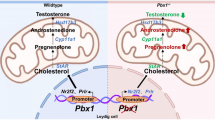Abstract
The mouse maelstrom (MAEL) gene has been found to be expressed in male germ cells and to play a role in spermatogenesis. Here, we cloned the human MAEL gene by digital differential display and found that, among human tissues, MAEL is only expressed in the testis, but it is also expressed in various cancer cell lines. The transcription start site of the MAEL gene is 74-bp upstream of the start codon. The region from −216 to +150 is the basal promoter of the MAEL gene, and a CpG island (−295 to +148) is located in this region. Treatment with the demethylating agent 5′-Aza-2-Deoxycytidine significantly upregulated MAEL expression. These results suggest that MAEL is a novel cancer/testis-associated gene and is regulated by DNA methylation.



Similar content being viewed by others
References
Zendman AJ, Ruiter DJ, Van Muijen GN (2003) Cancer/testis-associated genes: identification, expression profile, and putative function. J Cell Physiol 194:272–288
Hofmann O, Caballero OL, Stevenson BJ, Chen YT, Cohen T, Chua R, Maher CA, Panji S, Schaefer U, Kruger A, Lehvaslaiho M, Carninci P, Hayashizaki Y, Jongeneel CV, Simpson AJ, Old LJ, Hide W (2008) Genome-wide analysis of cancer/testis gene expression. Proc Natl Acad Sci USA 105:20422–20427
Simpson AJ, Caballero OL, Jungbluth A, Chen YT, Old LJ (2005) Cancer/testis antigens, gametogenesis and cancer. Nat Rev Cancer 5:615–625
Scanlan MJ, Simpson AJ, Old LJ (2004) The cancer/testis genes: review, standardization, and commentary. Cancer Immun 4:1
Grizzi F, Franceschini B, Hamrick C, Frezza EE, Cobos E, Chiriva-Internati M (2007) Usefulness of cancer-testis antigens as biomarkers for the diagnosis and treatment of hepatocellular carcinoma. J Transl Med 5:3
Clegg NJ, Frost DM, Larkin MK, Subrahmanyan L, Bryant Z, Ruohola-Baker H (1997) Maelstrom is required for an early step in the establishment of Drosophila oocyte polarity: posterior localization of grk mRNA. Development 124:4661–4671
Findley SD, Tamanaha M, Clegg NJ, Ruohola-Baker H (2003) Maelstrom, a Drosophila spindle-class gene, encodes a protein that colocalizes with Vasa and RDE1/AGO1 homolog, Aubergine, in nuage. Development 130:859–871
Lim AK, Kai T (2007) Unique germ-line organelle, nuage, functions to repress selfish genetic elements in Drosophila melanogaster. Proc Natl Acad Sci USA 104:6714–6719
Costa Y, Speed RM, Gautier P, Semple CA, Maratou K, Turner JM, Cooke HJ (2006) Mouse MAELSTROM: the link between meiotic silencing of unsynapsed chromatin and microRNA pathway? Hum Mol Genet 15:2324–2334
Soper SF, van der Heijden GW, Hardiman TC, Goodheart M, Martin SL, de Boer P, Bortvin A (2008) Mouse maelstrom, a component of nuage, is essential for spermatogenesis and transposon repression in meiosis. Dev Cell 15:285–297
Zhang D, Xiong H, Shan J, Xia X, Trudeau VL (2008) Functional insight into Maelstrom in the germline piRNA pathway: a unique domain homologous to the DnaQ-H 3′-5′ exonuclease, its lineage-specific expansion/loss and evolutionarily active site switch. Biol Direct 3:48
Nie DS, Xiang Y, Wang J, Deng Y, Tan XJ, Liang YH, Lu GX (2005) Identification of a novel testis-specific gene mtLR1, which is expressed at specific stages of mouse spermatogenesis. Biochem Biophys Res Commun 328:1010–1018
Scheurle D, DeYoung MP, Binninger DM, Page H, Jahanzeb M, Narayanan R (2000) Cancer gene discovery using digital differential display. Cancer Res 60:4037–4043
Zhou J, Fan C, Zhong Y, Liu Y, Liu M, Zhou A, Ren K, Zhang J (2005) Genomic organization, promoter characterization and roles of Sp1 and AP-2 in the basal transcription of mouse PDIP1 gene. FEBS Lett 579:1715–1722
Sigalotti L, Coral S, Altomonte M, Natali L, Gaudino G, Cacciotti P, Libener R, Colizzi F, Vianale G, Martini F, Tognon M, Jungbluth A, Cebon J, Maraskovsky E, Mutti L, Maio M (2002) Cancer testis antigens expression in mesothelioma: role of DNA methylation and bioimmunotherapeutic implications. Br J Cancer 86:979–982
Huang Y, Wang Y, Wang M, Sun B, Li Y, Bao Y, Tian K, Xu H (2008) Differential methylation of TSP50 and mTSP50 genes in different types of human tissues and mouse spermatic cells. Biochem Biophys Res Commun 374:658–661
De Smet C, Lurquin C, Lethe B, Martelange V, Boon T (1999) DNA methylation is the primary silencing mechanism for a set of germ line- and tumor-specific genes with a CpG-rich promoter. Mol Cell Biol 19:7327–7335
Acknowledgements
This work was supported by National Basic Research Program of China (No. 2008CB517306), Hunan Provincial Department of Science & Technology (No. 2007CK3052) and Scientific Research Fund of Hunan Provincial Education Department.
Author information
Authors and Affiliations
Corresponding authors
Rights and permissions
About this article
Cite this article
Xiao, L., Wang, Y., Zhou, Y. et al. Identification of a novel human cancer/testis gene MAEL that is regulated by DNA methylation. Mol Biol Rep 37, 2355–2360 (2010). https://doi.org/10.1007/s11033-009-9741-x
Received:
Accepted:
Published:
Issue Date:
DOI: https://doi.org/10.1007/s11033-009-9741-x




